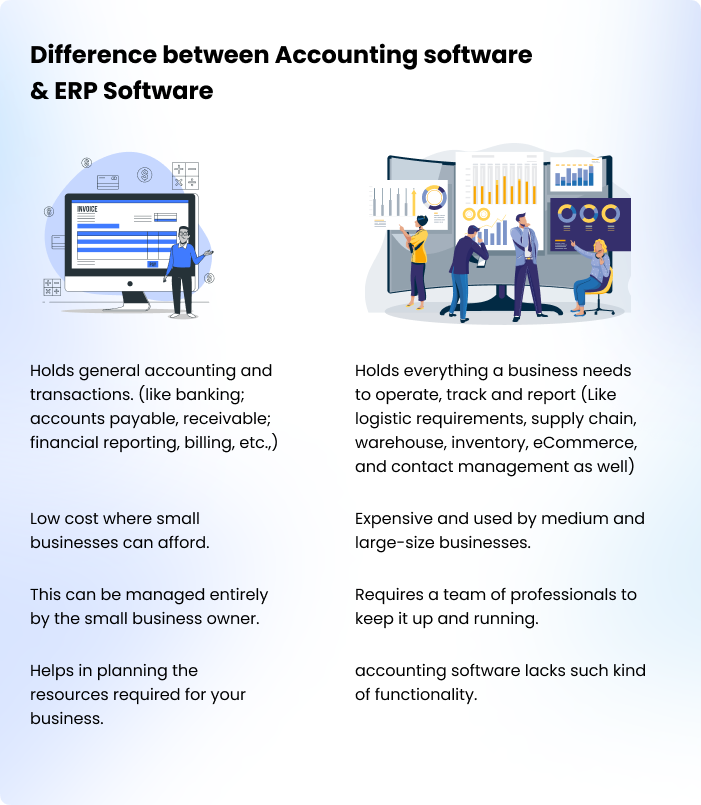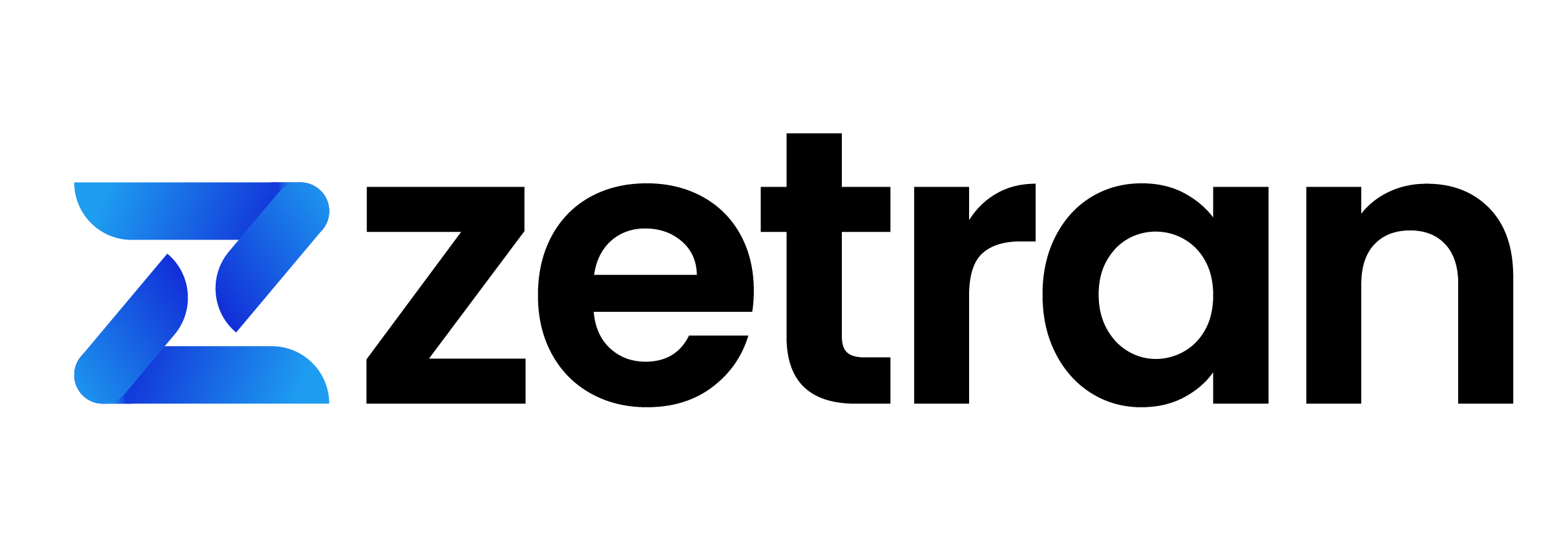People that are actively involved in the business world keep on using some technical terms so frequently. Many times, they even forget that those industry jargons are not understandable to everyone. The same is the condition of ERP software; they are the essential tools for the experts, but maybe a complicated term for beginners.
So, If you are interested to know the difference between ERP and accounting software, it is good to check in-depth details about both these topics. It is observed that many people use these terms interchangeably, but in actual ERP and Accounting software are two different things. Their functionality and applications vary by a considerable level.
What is an Accounting Software?
Accounting software, as the name indicates, is primarily used for managing accounts of a company. Practically, accounting software takes responsibility to manage financial aspects of the business while making a perfect track of all business transactions, journal entries, AR/AP, and general ledger utilization. It also includes details about balance sheets and income statements. Accounting software is the most reliable tool to maintain the financial health of an organization.
What is an ERP Software?
On the other side, ERP stands for Enterprise Resource Planning, and this module is capable enough to track the intangible and tangible assets of a company including inventory management, order fulfillment, production management, invoicing, reporting, and job costing as well. At the same time, it extends support to Customer Relationship Management and Human Capital Management. Basically, this tool is designed to pack the entire business into a single suite with efficient management options.
The accounting software is not designed to offer Manufacturing Management, but ERP software can handle these needs very well. This feature includes Production Planning, Bill of Materials, and many more.
While fulfilling the rising demands of the customers, businesses often face situations where it becomes difficult to manage the supply of shipments and production resources. It usually leads to missed deliveries, order changes, and machine breaks as well. In such situations, businesses need production management software to manage a variety of aspects with ease. When accounting software fails to handle such complexities; the ERP can serve the needs very well.
In simple words, the ERP solution helps businesses to find more ways to grow with a satisfied customer base in the competitive market.
What is ERP for small businesses?
ERP is denoted as Enterprise Resource Planning. An ERP is the type of software that helps to connect different features or software in a single tool for business purposes. ERP software will help to run your entire business. ERP will integrate all your company’s core process in one place. Some of the core processes include accounting, sales, finance, supply chain, HR, services, and manufacturing among others.
In general, ERP software will function in real-time. A common database is used for all of its actions. In simple words, ERP will integrate all your company core process in one place and it is a type of management software.
Major Differences Between ERP and Accounting Software:
Today, with the help of modern cloud technology, you can make use of customized accounting software and ERP (Enterprise Resource Planning) software like SAP, Oracle to manage your financial transactions and ensure stress-free bookkeeping. This can be easily deployed in the cloud and used as a subscription service instead of installing your own servers and purchasing software licensing.
But you need to understand the difference between ERP and accounting software before you can decide which will suit your needs better.
ERP Vs. Accounting Software

The basic difference between both these terms is that the accounting software usually helps to covers areas like banking; accounts payable, receivable; financial reporting, and some basic sales recordings. In simple terms, accounting software is designed to manage a few specific business areas. However, ERP software further includes the basic functionality of accounting along with few additional abilities to manage logistic requirements, supply chain, warehouse, inventory, eCommerce, and contact management as well. ERP can be better defined as a fully integrated tool with an end-to-end solution for businesses.
Let’s find out the three major differences between accounting software and ERP:
1. While the best free accounting software manages the company’s accounts or how your money moves, ERP is a business software that helps you to track your inventory management, tangible and intangible assets, invoicing, order fulfillment, job costing, etc.
In accounting, you deal with the general ledger, account receivable and payable, payroll, expenses, and more. But enterprise resource planner (ERP) helps in managing issues that are not addressed in accounting. In other words accounting functions is a subset of ERP software. ERP is an accounting software plus much more.
2. Usually there is a big difference when it comes to the cost of ownership of software between ERP & Accounting software. While Accounting software is usually low cost, a small business can easily afford accounting software. Whereas the cost of implementation and maintenance of ERP can be highly expensive even for medium to large-sized businesses.
3. Another major difference is the amount of personnel required to manage the software. While accounting software can be managed entirely by the small business owner. Maintain an ERP system would require a team of professionals to keep it up and running. The learning curve is also usually steep for ERP software.
4. The accounting software has restricted or basic inventory tracking,
along with web-based add-ons. On the other hand, the ERP system is flexible enough to set the users free from the shackles in accounting software. It also enables you to increase the accuracy and customer service of your business.
Meanwhile, ERP helps you in reducing stock carrying costs, inventory write-offs, and labor costs. In addition, the ERP’s inventory management module helps you in making faster and accurate decisions that are critical in today’s complex international inventory environments.
5. ERP can help in planning the resources required for your business like the number of raw materials required for the production process, also help in managing a highly complex production line, however accounting software lacks such kind of functionality.
While both are important for your business in their own unique ways, the ERP is more flexible compared to the accounting software and lets you manage different tasks more conveniently. It all comes down to the needs of your business and the size of the business.
Usually, a small business can be quite happy with accounting software for quite a long time, whereas comparatively big businesses or businesses handling a lot of manufacturing and inventory would need ERP software to manage their business effectively.
How does ERP help Accounting Software for Small businesses?
An ERP may or may not depend on the size of a company. ERP helps you to get a better view of all your business areas. ERP provides your company to get an accurate decision in a faster way, without affecting the company.
-
Easy to manage the needs of accounting:
The accounting department tends to be an essential part of any type of organization. Through an ERP system, you can manage a lot more areas. Here are some of them.
- ERP system helps you more to estimate the cash flow management and the capital requirements.
- Installing ERP helps you more in planning time and budget accordingly. Proper and healthy budget planning helps you to assess your small business’s financial health.
- Data management plays a major role in a business. Managing data in a smarter way can go a long way. ERP software for small businesses can keep all your data in a single place.
-
Analytics/Reporting:
A data is said to be useful, only if your company can analyze those data by understanding them. If not, there is no use in it! An ERP does this! Most of the leading companies contain attractive reporting and the best analytics tools that help the user’s to track their KPIs and display theirs requires metrics.
Since an ERP is one complete box, it helps every business to realize that how a small problem or change in one department can affect the rest of all other departments in a company.
-
Data Quality and Financial Management:
An ERP system helps the accounting department to easily access the data. An organization with well-organized resources and the process will enable them to sustain good financial measures. An ERP has secured financial information and your co-author can manage and edit if they have any authority to access them.
There are organizations, which use a separate system for both sales and accounting activities. Those organizations should maintain their data manually. But an ERP system for accounting contains an automatic data transfer. In this case, you don’t require any manpower to manage those data. In addition, the data management is accurate, consistent, and faster.
-
Maintains Customer Relation:
ERP helps small businesses to deliver their product or services to their client at a faster rate. While the client purchasing from the seller, the client should feel satisfied while they purchase from the seller. The seller must make the client feel good about themselves, while they accept the product from you. This will create a high notion about your company. You can attain this customer satisfaction through ERP software.
-
Coordination between Employees:
An ERP helps in integrating all your processes! This helps to boost the coordination between employees. Also, an ERP helps in providing online communication directly between two or more employee members of your company. This leads to a decrease in the necessity of your employees’ physical presence.
-
Risk Management:
An ERP is not only easy to manage, but also you can reduce your risk factors by identifying them. An ERP system is accurate and reliable. An ERP system helps to reduce the chances of making errors. As there is a possibility to predict all your events with the help of an ERP system, you have an opportunity to forecast all your risks.
Do the ERP’s are same for Small and Large Businesses?
No! Essentially small business and large business ERPs are not the same! While comparing their ERPs, an ERP for large businesses is around longer comparing the small business ERP. For small businesses, an ERP is just an option when the tedious functions and the costs came down a notch.
Here are the main reasons for the above-mentioned points.
- The small business, since they are in the beginner level, they don’t need an advanced enterprise function. Also, they can’t able to compete with large business ERPs. They are higher in price.
- When it comes to small businesses, they are more adaptive to change their business work. In the case of large businesses, it is more difficult.
The ERPs for small and large businesses are designed in different ways. Both have different business implementation methods. But at present, we have an option called cloud-based ERP which tends to be accessible for small businesses.





